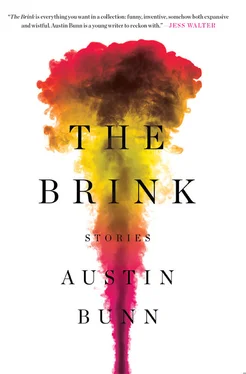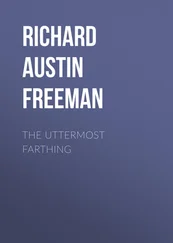Austin Bunn
The Brink: Stories
For my mom,
who dreamed this first.
The mind blanks at the glare. Not in remorse
— The good not done, the love not given, time
Torn off unused — nor wretchedly because
An only life can take so long to climb
Clear of its wrong beginnings, and may never;
But at the total emptiness for ever,
The sure extinction that we travel to
And shall be lost in always. Not to be here,
Not to be anywhere,
And soon; nothing more terrible, nothing more true.
PHILIP LARKIN, “AUBADE”
How to Win an Unwinnable War
The catalog comes in a sharp white envelope, “PLEASE FORWARD” written in his father’s cursive on the outside. Sam paws the return label, which reads, “Governor’s School for the Gifted and Talented.” The governor has noticed him.
“Tell me it’s free,” Mom says. “Free would be nice.”
But Sam would do summer school even if he had to drain his savings account or extend his paper route. He likes school — the sweet octane of highlighters, the systems of reward — with a pureheartedness most seventh-grade boys reserve for taking advantage of themselves. He skims the courses, Euclidean Geometry, Beginning Japanese, and stops at a “late addition.” How to Win a Nuclear War.
Suddenly, Sam knows exactly how he’ll spend the summer.
Tucked in his closet is a “go bag” with Band-Aids, sunblock, shin pads, and the cinnamon granola bars no one wants. As far as he is concerned, nuclear holocaust is the only thing worth thinking about. Back in the winter, when Mom left his father and they moved into the apartment, she promised Sam a gift, a prize for coming. He asked for a plastic barrel to store fresh water. She bought him a fern instead, a fern now browning on the front stoop. According to Sam’s estimates, Princeton, New Jersey, sits just outside the kill zone of Manhattan. He has a chance of surviving. He and his mom have a distinct chance, and the idea that he could save people orients him like a polestar. The year is 1987.
“Seriously? You want to take that class?” Mom asks, setting down her book, a hardcover for nursing school. The book fascinates Sam, the photographs of gashes and lesions and people with cowed, empty looks, as though no matter how pink or black the wound, no matter how dire, they still might yawn. “This is your summer we’re talking about.”
“But summer school doesn’t cost anything. It’s zero dollars ,” Sam says. He digs around in the box of Fig Newtons tucked next to her on the chair. One is left. That is their rule now, living together as a team. Leave one behind.
“Promise me that when you find out how to win,” she says, signing her permission, “you’ll tell the governor. Tell everybody. Even if I’m not around.”
She will always be around. That is the whole point of winning.
“Now,” Mom says, “go get us more cookies.”
The first day, Mom drives up the narrow road of the local college. Workers in white suits rip long strands of ivy from buildings, and Sam is reminded of that movie, the one about the war against the plants, the one where we lose but there is an island.
“Your father will get you after,” she says. “Don’t let him take you to pizza again. That’s too much pizza happening.” Then she pulls her lips over her teeth like she has no teeth and, with her pinkie, scrapes a neat edge to her lipstick. The blouse she’s wearing, shiny and blue, is made from whatever hot-air balloons are made from. She wants to look pretty for someone, and Sam wants to tell her this is wrong. They need to go backward. They belong back with his father, at the house in the woods, with a basement and kerosene and a well, instead of the duplex apartment in town where, after the bombs, they could be forced to eat people.
She idles the car at the entrance to the hall, a stone building with a sign out front that says, “Gifted This Way.” “No grades here, right?” Mom asks.
“Right,” Sam says, even though he wishes there were grades, the proof that he matters to an indifferent world. For the past year, he has had a problem with caring too much. A C on an algebra test made him weep. When the art teacher called his mug an “ashtray,” he vomited. Later, in his diary, Sam wrote, “MUST DO BETTER,” and then practiced his telekinesis on a pencil, marshaling invisible forces in his favor.
Mom brushes his bangs. “And tell your father you need a haircut.”
Inside, the conference hall has the carpeted, low-traffic feel of the Unitarian church where Mom now takes him — stacked folding chairs, chandeliers, the sense of things moved to the side to make way for more boring. Kids scatter across the room with books in their laps, pretending to read. Nearby, two redheaded twins fight in slow-motion. One says, crazy-eyed and arms spread wide, “Enter Thunderdome!”
Sam finds a table with lanyards and takes his — his first official designation, and already he feels remarkable. At the front of the room, a bearded professor sits on a stage in hiking shorts and short-sleeved Hawaiian shirt. A giant metal bowl of poker chips rests in his lap. He has the lordly face of the one with the directions, and his fingers comb and coddle the black hair on his chin, like scratching something private and dark.
The professor whistles with two fingers. “We’re going to start with a game,” he says, and Sam’s heart sinks. He is terrible at competition, the neighborhood of failure. The turdlike mound of his mug returns to him.
The professor holds the bowl over his head like an offering. They are going to trade chips. Two blue chips equal one red chip and two green chips equal one blue — Sam only half follows — and in the end, only five chips in their hand will count.
“Count toward what?” asks one of the twins.
The professor says, “You’ll see.”
A mechanical door sighs open at the side of the room, and a boy in a wheelchair motors inside. Sam notices his white sneakers, splayed out to each side and unscuffed, the way Sam wants but can’t have because the world keeps making more dirt. A Panama hat shadows his face. The rest of him looks small and shrunken, like he’s been through the dryer. His plaid, long-sleeved shirt is buttoned all the way to the top, but his throat is a tendony stalk and doesn’t fill the collar. An older boy follows him in, carrying his backpack like it’s a dead animal. “Yowza,” he says. “Opening ceremonies in Dorktown?”
The boy in the chair tilts his head up to him. “You may leave, Teddy.”
The older kid dropkicks the bag into his lap and gives all of them the finger as he exits. The handicap door wheezes back into place.
“Please excuse my brother,” says the boy in the chair. His yellow eyes swim behind heavy glasses. “He was raised by snakes.”
The professor asks someone to get a lanyard for him — Ethan is his name — and Sam is nearest. Once more, the professor explains the rules and then dumps the bowl of chips on the carpet. Kids rush forward, giddy and screaming, a vortex of spaz.
As Sam hands Ethan his lanyard, he grabs Sam’s arm and pulls him close. His breath is a hot fog, the pallor of his skin almost butter. “Get us the red and blue ones,” Ethan says. “As many as you can.” A cough rumbles from inside him, and Sam steps away — he doesn’t want whatever Ethan has — and dives into the fray.
Since he’s started to clean the living room rug with his fingers, Sam has no problem working at carpet level. A girl with braces scratches his hand in desperation, and he scratches back. A boy stumbles and spills his hand, and the others set on the chips like feral dogs. Somehow, the carpet is covered with black chips and white chips, and Sam doesn’t remember the professor saying anything about them. Now the black and white chips are all that is left.
Читать дальше











